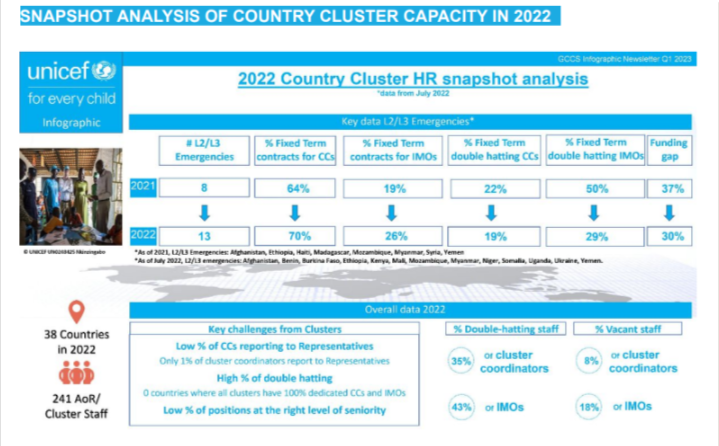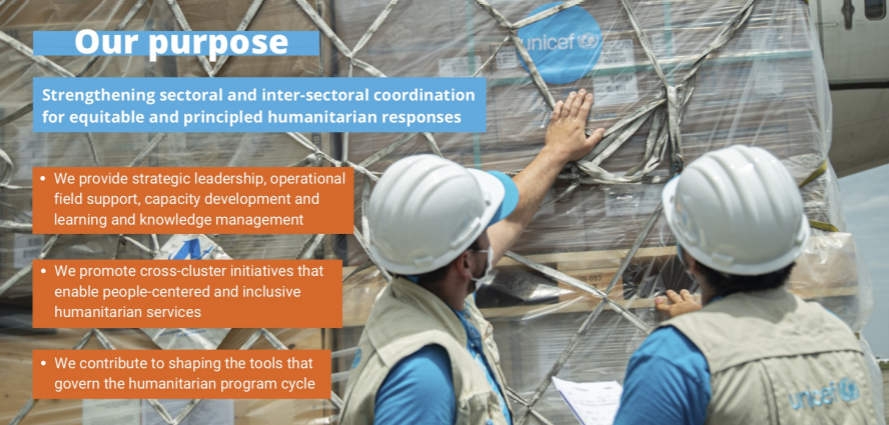STRENGTHENING HUMANITARIAN COORDINATION IN THE FIELD AS CLUSTER LEAD AGENCY: MESSAGE FROM OMAR ABDI, DEPUTY EXECUTIVE DIRECTOR - PROGRAMMES
“Cluster leadership and coordination is a critical role for effective humanitarian responses and cannot be left to chance”, points out the Deputy Executive Director for Programmes. In his end of the year communication, Omar Abdi highlighted the need to urgently address the recommendations made by the latest Evaluation of UNICEF’s Role as Cluster Lead (Co-Lead) Agency (CLARE II) and endorsed by UNICEF. He calls for strategic prioritization of coordination and proactive resource mobilization across the organization to ensure clusters are adequately staffed and resourced to effectively lead and coordinate humanitarian responses and deliver on our corporate accountabilities.
CLARE II highlighted that the Cluster Lear Agency accountabilities need to be given more prominence in UNICEF to ensure that adequate human and financial resources are allocated to cluster leadership. In response, the DED requested Country Offices to mainstream coordination into existing funding streams, while reassuring that Headquarters was considering several funding options. In 2022, HQ allocated USD 4.1 million in unearmarked humanitarian funding to address critical coordination gaps in Ethiopia, Somalia, Yemen, Mozambique, Niger, South Sudan, and State of Palestine (SoP). At the onset of 2023, another allocation of USD 3.5 million (more than 10 per cent) of Global Humanitarian Thematic funding was set aside to cover cluster coordination needs at country level
SNAPSHOT ANALYSIS OF COUNTRY CLUSTER CAPACITY IN 2022

As UNICEF is committed to fully implementing the recommended good practices outlined in CLARE II, staffing country clusters with the right capacity has become a priority. CLARE II called for a yearly snapshot as a pulse check to capture cluster staff at country level and the human resources analysis follows this approach. While some gaps in data remain, the main findings suggest progress made by L2/L3 country clusters. However, staffing coordination continues to require substantial efforts to ensure that coordination and information management duties are effectively fulfilled. For instance, avoiding the frequent use of “double-hatted” positions (people with more than one full time job) and non-fixed term contracts as recommended by CLARE II, particularly for information management positions. Highlighting a slight improvement in funding dedicated to coordination in 2022, it is necessary to continue working to close the funding gap and boosting coordination at country level in order to fill staff at the right level, supervision, contract and 100% dedicated to role.
2022 CLUSTER COORDINATION PERFORMANCE MONITORING REPORT
Cluster Coordination Performance Monitoring (CCPM) is a yearly country-led self-assessment exercise where country Clusters assess their performance regarding the six core cluster functions and accountability to affected populations through the broadest possible participation by cluster partners. UNICEF is committed to asking for feedback from its cluster stakeholders on a yearly basis, and reporting the results in its annual report. In 2022, UNICEF-led clusters completed a record 110 CCPM exercises in over 31 countries, including in 27 Countries with Humanitarian Response Plans (HRPs). All CCPM conducted scored Good or Satisfactory, with 82% of partners scoring coordination performance as ‘Good’ across all core functions (including accountability to affected populations), in line with 2021 rating. In addition, the average response rate among partners was 69%, slightly improving data from the previous year (64%). Similar to previous years, the highest participation was among national NGOs (75%), UN Organizations (71%) and national authorities (62%) whereas the lowest response rates were among Donors (36%) and ICRC/IFRC (45%). That exercise enables all cluster partners and coordinators to identify strengths and weaknesses, and agree on actions for enhancing coordination.
HAVE YOU SET YOUR DEVELOPMENT PLAN FOR THE YEAR?
It is the time of year for annual performance planning, but have you thought about what you will include in your PER’s Development Plan? Agora and the humanitarian coordination learning channel have prepared new content for you to develop your skills for the next step in your career. Managers can also suggest courses for their supervisees to develop their knowledge of clusters, but also of needs assessments, data and visualization skills, advocacy, partner capacity building and much more. Available in English, French and Spanish, the online courses cover many useful and transversal skills for all! Whether you already are an IMO, experienced or freshly deployed, or thinking of becoming one, whether you are UNICEF cluster staff or not yet, whether you are a programme staff or in PM&E, or even seeking to switch clusters, whether you are one of our beloved partners, or you are thinking about a career in coordination. Find the course for you.
VIRTUAL TRAINING ON GENDER-BASED VIOLENCE RISK MITIGATION LAUNCHED
UNICEF teams working on GBV in emergencies collaborated in the design of a Gender-Based Violence (GBV) Risk Mitigation virtual training package for Standby Partners. Almost 30 Sector Specialists from Canadem, Danish Refugee Council, Irish Aid, Swedish Civil Contingencies Agency (MSB), RedR Australia completed the training. This translates to a cohort of sector specialists who are better equipped to integrate and implement GBV risk mitigation measures when deployed to Child Protection, Education, Health, Nutrition, and WASH clusters/sectors. The training is available on the UNICEF learning platform and free to access for all of those interested in taking it.

For additional information on the work of each cluster/area of responsibility please click on the images below.
We would welcome your feedback on our newsletter!
Please share your thoughts with us.
If you encounter any issues while opening links, please contact us
Copyright © Global Cluster Coordination Section, All rights reserved.